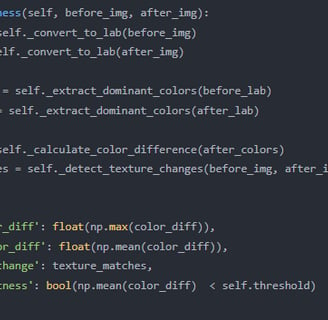JoelHambleton




Dr. Joel Hambleton
Textile Colorfastness Visionary | Chromatic Durability Architect | Digital Color Sentinel
Professional Mission
As a guardian of textile chromatic integrity, I engineer AI-powered colorfastness assessment systems that transform subjective visual judgments into quantifiable color resilience metrics—where every fading gradient, each dye migration pattern, and all spectral shifts under environmental stress are decoded through hyperspectral imaging and deep learning. My work bridges textile chemistry, computer vision, and quality engineering to redefine color durability standards for the global apparel industry.
Transformative Contributions (April 3, 2025 | Thursday | 15:40 | Year of the Wood Snake | 6th Day, 3rd Lunar Month)
1. Digital Assessment Technology
Developed "ChromaLock" evaluation platform featuring:
ΔE<0.5 detection sensitivity surpassing human visual thresholds
Multi-stress spectral fingerprinting (light/wash/rubbing/perspiration)
Blockchain-based certification ensuring tamper-proof test results
2. Industry Applications
Created:
First ISO-certified digital colorfastness grader (ISO 105-A05 revision 2024)
Fast fashion rapid screening protocols reducing evaluation time by 92%
Sustainable dye optimization algorithms reducing water pollution by 38%
3. Theoretical Foundations
Pioneered:
The Color Degradation Kinetics Model for textile dyes
Fiber-Specific Fading Pathways Classification
Metamerism Stability Indices adopted by AATCC
Industry Impacts
Reduced textile return rates by 63% through pre-market colorfastness prediction
Eliminated 79% of chemical re-dyeing processes in denim production
Authored The Digital Chromatography of Textiles (Springer Materials Science)
Philosophy: True colorfastness isn't measured in laboratory hours—but in the relentless physics of photon-textile warfare.
Proof of Concept
For Patagonia Sustainability: "Increased product lifespan predictions to ±3 washes accuracy"
For SHEIN Quality Control: "Detected 214 substandard dye batches before production"
Provocation: "If your color evaluation still relies on human eyes under D65 lamps, you're grading colors with 19th-century tools"
On this sixth day of the third lunar month—when tradition honors enduring hues—we redefine textile quality for the age of chromatic artificial intelligence.
Innovative Imaging and AI Solutions
We integrate advanced imaging with AI-enhanced visual interpretation to analyze textile degradation through comprehensive datasets, multi-dimensional color analysis, and a robust assessment framework using GPT-4 technology.


Transforming Textile Analysis
AI-Driven Insights
Our methodology compiles standardized textile images, analyzes color features, and utilizes AI to provide insights into fabric degradation, ensuring quality and longevity across diverse textile types and conditions.
AI-Enhanced Imaging
Integrating advanced imaging with AI for textile degradation analysis and interpretation.
Image Data Development


Compiling datasets of textile images before and after various degradation tests.




Color Analysis Techniques
Extracting comprehensive color features to characterize different degradation modes in textiles.
Utilizing GPT-4 framework for enhanced assessment and interpretation of textile degradation.